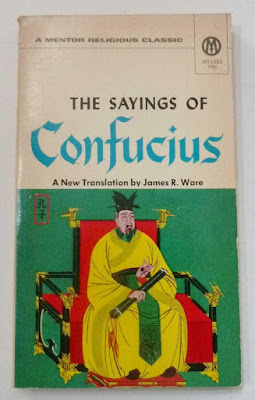The Wisdom of Confucius
Many in the West see Confucius as the founder of a religion. Confucius did not see himself that way.
In Chapter VII, 1 of “The Sayings of Confucius” he said, “I transmit, but I do not create; I am sincerely fond of the ancient. I would compare myself to our Old P’eng who was fond of talking about the good old days.”
Confucius can be faulted for idealizing China’s past. Archaeology demonstrates that centuries before his time Chinese governments gave human sacrifices on a large scale.
Nevertheless, one can agree with what he said in Chapter II, 16 “It is indeed harmful to come under the sway of utterly new and strange doctrines.”
Confucius can most accurately be seen as a moral and political philosopher, who also discussed theology. He often spoke of the rites, and wanted them to be carried out in the proper manner. Nevertheless, his emphasis was on religious practice, rather than religious doctrine.
In Chapter VII, 21 it is written: The Master did not speak of anomalies, feats of strength, rebellions, or divinities.
Chapter XI, 12: Chung Yu inquired about the proper treatment of spirits and divinities.
[Confucius answered] “You cannot treat divinities properly before you are able to treat your fellow-men properly.”
When he inquired about death, the reply came, “You cannot know about death before you know about life.”
Confucius accepted the existence of the deities commonly believed in during his life, which was 551 to 479 B.C. He thought religious practices carried out in the traditional manner – which by his time excluded human sacrifices - had a harmonizing effect on society. He also thought religious dogmatism was divisive. When we consider the history of religion in the West it is easy to agree.
The Sayings of Confucius, which are usually called in the West “The Analects of Confucius,” and eight additional classics became the cannon, not of the autochthonous religion of China, but of the Imperial Exam System. The exams were essay exams, based on what were called “The Five Classics and the Four Books.” Beginning with the Han Dynasty, which began 206 B.C., young men who could pass the Imperial Exams entered the Scholar Gentry, and became our equivalent of civil servants.
In the United States businessmen have usually had more wealth, power, and prestige than civil servants. In China members of the Scholar gentry had more of these than merchants.
Thus, gifted writers because government bureaucrats. Because Confucius discouraged religious speculation, they did not write great literature equivalent to the writings of Homer, the Greek tragic dramatists, Virgil, and Ovid, as well as the Bible. For knowledge of China’s native gods and goddesses we are restricted to Chinese folk tales. The native deities are worshiped in what is called “religious Taoism.” Philosophical Taoism consists of the writings of Lao Tzu, although Lao Tzu is considered to be a Taoist god. Somewhat equivalent to Jesus Christ, he lived on earth, and rose to Heaven.
Buddhism, which entered China during the Han Dynasty, is distinct from Taoism. Nevertheless, in Chinese history there has been little conflict between Buddhism and Taoism. Many Chinese practice both religions, just as many Japanese practice Buddhism and Shinto.
Confucius accepted inequality of wealth and power. He believed that those in subordinate positions had the obligation to obey their superiors. He also believed that those in dominant positions had the obligation to be protective toward their subordinates. In Chapter VI, 4 he said, “I have always understood Great Man does everything possible to help the poor but nothing to enrich the rich.”
In personal relations Confucius believed that people had greater obligations to relatives, especially parents, than to the government or the larger society.
The sayings of Confucius and writings in the Confucian tradition inspired China to develop a great and a harmonious civilization. Nevertheless, because Confucius directed the attention of China’s most intelligent men to the past, science and technology were not emphasized. Because science and technology is important to the invention of new weapons, China was unequal to the military challenge of the West during the nineteenth century and of Japan in the twentieth century.
Now the Chinese are making up for lost time. Fortunately, as they master Western science, they continue to study the sayings of Confucius, and the other classics in the Confucian tradition. There is often wisdom in tradition. Confucius was correct when warned about the danger of “utterly new and strange doctrines.”
James R. Ware was an Associate Professor of Chinese at Harvard University. His translation begins with an excellent introduction. It is easy to read, and can be read in one or two sittings. It rewards many re readings, although the sayings of Confucius should be studied in other translations as well.
https://www.amazon.com/gp/customer-reviews/R26OFXSOYZFGKY?ref=pf_vv_at_pdctrvw_srp


Comments
Post a Comment